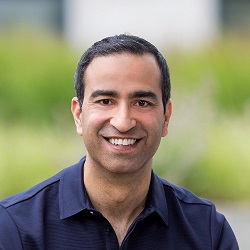
Changing a 50-year-old company cannot be easy. Over the last two years, the company has delivered some really interesting, bold innovations, investment, and teamwork. It has now a rationalised and modernised product portfolio. Changing the business models for some products to a subscription and SaaS based model, opened up technology partnerships with AWS and others. These changes are now translating into a real impact in the market, and for its customers. The company is delivering rich use cases of IoT Cloud hybrid integration, business process mining and self-serve analytics, all key to digital transformation. Although the brand remains relatively a minor player in North America, the company is pressing ahead with a multi-year transformation. Enterprise Times had a wide-ranging conversation with Sanjay Brahmawar.
Software AG today
How would Sanjay describe Software AG today?
“Like every individual and organisation throughout the globe, we have been through a lot with the impact of the pandemic. Furthermore, this is the third year of uncertainty, with the war in the Ukraine, high interest rates and rising inflation.
“However, Software AG’s digital transformation has progressed really well. We have moved forward with our Helix milestones to make the company more successful. Despite all of the uncertainty, the demand for technology remains strong. From all the conversations we have with clients, enterprises are still seeing digital transformation as a necessity. They need be able to deal with the current situation and have better technology. In addition to access to cloud technology and the ability to reduce costs. They want technology to predict supply chain issues more efficiently and be able to deal with the uncertainty effectively. So digital transformation is still on top of the agenda for most businesses.”
But what does that mean?
“That means that enterprises are buying mission-critical versus ‘nice to have’. They don’t want to put money into nice to have technology.”
Brahmawar believes that Software AG offers mission-critical solutions. He continued: “That is very positive for the company. We still are in a market where digital transformation is primary.”
The Software AG offering
A few years back, Software AG was emphasising the “Connected Enterprise.” How important is the concept to your relationships with businesses?
“The whole concept of the truly connected enterprise has become even more obvious and critical. The pandemic was a wakeup call for businesses. Many companies were forced to undertake some infrastructure band-aid work – ‘Our people can actually access the systems from their home.’ However, enterprises need more than access to systems. They need to have the full workflow of data in a smooth, frictionless manner.

“Businesses are beginning to realise that cloud technologies are very important and relevant, to really enable hybrid working. A truly connected environment ensures disparate landscape has an integration layer that allows businesses to move data between applications. Irrespective, if data is on prem, private cloud, public cloud or on the edge. It has become the mission critical glue and even more evident to companies. And that’s why truly connected enterprise is still spot-on.”
Understanding digital transformation
Do you think enterprises really understand digital transformation?
“A successful digital transformation often requires cultural changes within the organisation. For instance, Software AG’s shift from a perpetual licence model to subscription and SaaS model required a fundamental change to our business culture.
“In a perpetual licence model, a software company sells a solution to a client. They will check and maintain the solution and returns in four years to sell an update or a new solution. A subscription or SaaS model requires a totally different mindset. The moment a software company sells a subscription, they have to engage with the client immediately. They must ensure the customer success starts immediately, helping the client deploy the technology. This requires a mindset change and planning the customer lifetime value journey. Software AG have the opportunity of real engagement with customers.
“The data generated from this relationship gives Software AG a real understanding of how our customer works. How they use technology to gain competitive advantage. As a business, we learn what is important to our customers. So, we essentially have an innovation pipeline coming from our product teams.”
An underwhelming marketing position?
Compared to your competitors, Software AG’s marketing position is underwhelming. How do you intend to change that?
“I think your observation of Software AG is a good criticism of us. We are not the type of company with a blockbuster approach to marketing. However, we have started to make association between our individual capabilities like Cumulocity, WebMethods or ARIS to the truly connected enterprise concept. Increasingly, customers understand Software AG offers that end-to-end layer that businesses can use. Moreover, they are associating the truly connected enterprise, their digital backbone, with Software AG.
“We are also investing into specific campaigns and events that showcase our technology, brand and principles. Our sponsorship of the Electric Racing Academy (ERA) is a great practical example and supports our commitment to sustainability. Software AG is all about sustainability through IoT or ARIS. I believe sustainability should be a core part of a company’s corporate responsibility. It needs to be planned in a structured way. Currently many CEOs are throwing very lofty sustainability goals, but where are the action plans? How will they achieve these targets? With IoT, Cumulocity or ARIS Sustainability we can help companies build a roadmap. Let’s bring lofty goals, real roadmap actions and plans together. Then companies can feel they are truly becoming more sustainable.”
The significance of IoT
How significant is IoT in Software AG’s future product plans.
“IoT has, has matured quite a lot over the last few years. I started working on IoT at IBM Watson in 2015. In those days the use case was considered mature if you had a $50k pilot or proof of concept. Today we are signing multimillion-dollar deals with clients, so things have evolved since then.
“There are particular areas where the use cases are more mature now – smart, connected, industrial products. Factories where industrial products are equipped with sensors monitoring how assets are performing in the field. Data from these assets are collected and fed to the field service management solution. As a result, your engineers are far better equipped in terms of how to maintain them.
“In medical technology, whether it’s a hospital bed, which is pretty much a computer today, or lab testing equipment. These are all connected and monitored remotely with good uptime all delivering much higher value. They also help the manufacturers turn them into a service rather than just having a product.
“A third sector is logistics supply chain. Customers such as DHL are leveraging IoT to be able to really understand links in the supply chain. Utilising real-time data such as cold storage movement or from high value goods that is moving through the supply chain. So, these key indicators can be tracked and more effectively managed. IoT, together with blockchain can help enterprises manage the supply chain in a very secure and traceable manner.”
Responding to the appeal of MACH
How will Software AG respond to the increasing appeal of MACH (Microservices, API-First, Cloud-Native, and Headless) which is becoming increasingly attractive to larger enterprises.
“MACH is a logical way of thinking for any business. Technology has to be as intuitive. Like the iPhone – there is no manual for the iPhone. While some may think Software AG as an old monolithic entity, we are not that today. All our products and capabilities are based on microservices. Kubernetes enables us to deploy them in such a way that they are agile, open and flexible., they are also modular. Customers can take our API Management, containerise it, and deploy in a place they can take our app. Customers are using our technology in this modular way and very much because businesses are evolving and changing so fast.
“So, I think the days of having these large monolithic platforms have gone. Customers are using best-of-breed and they are containerising them and deploying them when needed.”

























